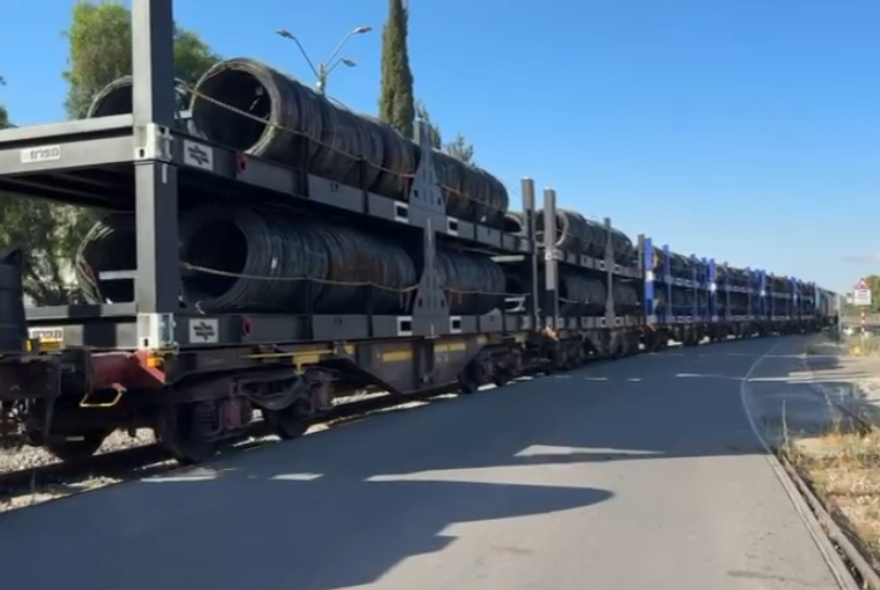
For the first time in Israel: An advanced freight train, which includes double-decker facilities for transporting cargo, set off today. This is part of a move led by the Ministry of Transportation, led by Minister of Transportation Miri Regev, as part of a comprehensive policy to expand rail transportation and reduce congestion on the roads.
The train, which departed from the Israel Shipyards port towards Kiryat Gat, carried "steel platforms" - two-story facilities that allow for doubling the amount of steel coils carried in each car.
The innovation is expected to streamline the process of transporting goods, reduce the number of trucks on the roads, and save manpower in the loading and unloading processes.
Israel Railways already operates about 20 facilities of this type, and by the end of the month their number will reach 50. This will make it possible to transport up to 50 tons of steel coils in a wagon (instead of 25 today), and later even transport up to 2,000 tons of cargo in an entire train, a move that will take hundreds of trucks off the roads every day.
In the past year, as part of the Ministry of Transportation's policy, Israel Railways connected all Mediterranean ports to the national rail network, and also resumed freight train traffic at the Beit Shemesh terminal.
Each freight train replaces between 60 and 70 heavy trucks, providing significant transportation, environmental, and economic benefits, including reducing congestion and pollution, improving safety, reducing erosion of road infrastructure, and lowering transportation costs that affect the price of the final product.
The move is integrated into the strategic development plans led by Minister Regev to upgrade the railway in Israel, including the fourth track on the Ayalon, electrification of tracks, development of cargo terminals, expansion of double tracks and interregional connections, based on a national concept according to which the railway should serve as a central anchor in public transportation and in service of the Israeli economy.
Minister of Transportation Miri Regev: "The railway is the backbone of the national transportation system in transporting passengers, and my vision is that it will also play a central role in transporting cargo. Each freight train takes dozens of trucks off the road and contributes to reducing congestion, reducing pollution, improving safety and lowering the cost of living. The Ministry of Transportation continues to lead ambitious development plans for the development of the national railway network from Kiryat Shmona to Eilat, plans that also include significant strengthening of the cargo transportation system."
Ministry of Transportation Director General Moshe Ben-Zaken: "Increasing freight transportation by rail is a paramount transportation, environmental, and economic interest. We are working to significantly upgrade the rail network in Israel, both for the benefit of passengers and for the benefit of the economy. The new move reflects the effort to make freight transportation safer, greener, and more efficient, while reducing infrastructure erosion and streamlining port operations."
Chairman of the Board of Directors of Israel Railways, Adv. Moshe Shimoni: "The introduction of double-decker facilities for freight trains is another step towards a new and more efficient era of transporting goods by rail in the State of Israel. Israel Railways has set itself the goal of improving the fabric of life in the country, both in terms of passenger service through extensive investment in new track development projects, and in terms of upgrading freight train traffic, the impact of which will be felt over time in all areas of life."
Israel Railways CEO Shiko Zena: "The use of double-decker facilities is an excellent example of the impressive efficiency processes we have led in recent years in Israel Railways' freight division. Alongside advanced rail connections to Mediterranean ports, which contribute significantly to the economic benefit of the economy, we continue to promote infrastructure and development projects throughout the country, with the aim of providing a quality response to growing demand, contributing to the restoration of Israel's economy and reducing road congestion through safer, greener and more efficient freight transportation."